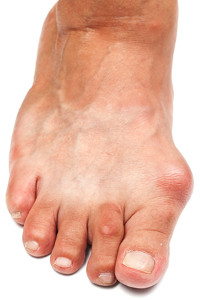 A bunion signifies a structural bone disorder within the foot. You may notice a bunion if there is a bump at the base of the big toe, or a “tailor’s bunion” if there is a bump at the bottom of the little toe. There are many ways to alleviate the symptoms of bunions without curing the condition. These include wearing appropriately fitted shoes, using shoe inserts, and avoiding activities that increase the pain. For a more comprehensive treatment option, you could take pain-relieving medication or receive cortisone injections. If this condition is causing pain and discomfort for the majority of the day, patients may consider surgery for permanent removal of the bunion. If you believe you may have a bunion, it is advised that you contact a podiatrist who can offer correct treatment options.
A bunion signifies a structural bone disorder within the foot. You may notice a bunion if there is a bump at the base of the big toe, or a “tailor’s bunion” if there is a bump at the bottom of the little toe. There are many ways to alleviate the symptoms of bunions without curing the condition. These include wearing appropriately fitted shoes, using shoe inserts, and avoiding activities that increase the pain. For a more comprehensive treatment option, you could take pain-relieving medication or receive cortisone injections. If this condition is causing pain and discomfort for the majority of the day, patients may consider surgery for permanent removal of the bunion. If you believe you may have a bunion, it is advised that you contact a podiatrist who can offer correct treatment options.
If you are suffering from bunions, contact one of our podiatrists of Sutera and Jones Surgical Podiatry. Our doctors can provide the care you need to keep you pain-free and on your feet.
What Is a Bunion?
A bunion is formed of swollen tissue or an enlargement of boney growth, usually located at the base joint of the toe that connects to the foot. The swelling occurs due to the bones in the big toe shifting inward, which impacts the other toes of the foot. This causes the area around the base of the big toe to become inflamed and painful.
Why Do Bunions Form?
Genetics – Susceptibility to bunions are often hereditary
Stress on the feet – Poorly fitted and uncomfortable footwear that places stress on feet, such as heels, can worsen existing bunions
How Are Bunions Diagnosed?
Doctors often perform two tests – blood tests and x-rays – when trying to diagnose bunions, especially in the early stages of development. Blood tests help determine if the foot pain is being caused by something else, such as arthritis, while x-rays provide a clear picture of your bone structure to your doctor.
How Are Bunions Treated?
- Refrain from wearing heels or similar shoes that cause discomfort
- Select wider shoes that can provide more comfort and reduce pain
- Anti-inflammatory and pain management drugs
- Orthotics or foot inserts
- Surgery
If you have any questions, please feel free to contact one of our offices located in Media, Glen Mills, Riddle Memorial Hospital, and Concordville, PA . We offer the newest diagnostic and treatment technologies for all your foot care needs.
